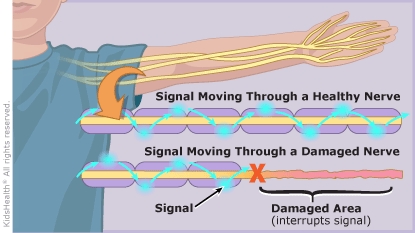Guillain-Barré Syndrome
What Is Guillain-Barré Syndrome?
In Guillain-Barré syndrome (GBS), the body's immune system attacks the nerves outside the brain and spinal cord (the peripheral nerves). This causes temporary weakness or even paralysis (being unable to move) in parts of the body.
GBS is rare, but can be serious. If it affects the chest muscles, for example, a person can have breathing trouble and need to use a ventilator for a while. The good news is that the paralysis that can happen usually is temporary.
What Happens in Guillain-Barré Syndrome?
The peripheral nerves send signals from the brain to the muscles and tell them to move. They also send sensory signals (such as touch, pressure, temperature, and pain) to the brain.
Guillain-Barré (gee-LAN-buh-RAY) syndrome temporarily damages these nerves, which interrupts the signals. So someone with the condition may have weakness or problems moving, or may feel pain, numbness, or tingling in the arms or legs.

What Causes Guillain-Barré Syndrome?
In GBS, the attack on the immune system usually involves proteins called antibodies. Normally these help destroy invading bacteria or viruses. But in GBS, these antibodies mistakenly damage parts of the peripheral nerves.
Doctors often don't know the exact cause of Guillain-Barré. It might be a type of autoimmune disease (when the body's immune system damages normal, healthy body tissues like the peripheral nerves).
Many people with the condition have had a viral or bacterial infection in the 2 weeks before symptoms began. The infections usually are in the respiratory system or gastrointestinal tract. Sometimes minor surgery or something else might trigger symptoms.
What Are the Signs & Symptoms of Guillain-Barré Syndrome?
Symptoms of GBS, in the order that they usually happen, include:
- tingling or pain in the toes and fingertips
- weakness or pain in the legs that causes trouble walking
- loss of reflexes (for example, the knee doesn't jerk when it's tapped)
- facial weakness
- breathing problems
How Is Guillain-Barré Syndrome Diagnosed?
Doctors ask questions about the symptoms and do an exam. If GBS seems likely, the doctor will ask whether the symptoms:
- are on both sides of the body
- started quickly
- are getting worse
They also might order tests to confirm the diagnosis, such as:
- a spinal tap (lumbar puncture) to check for cells in the spinal fluid
- electromyogram (EMG) to measure the electrical activity of the muscles and nerves
- nerve conduction velocity (NCV) test to see how fast electrical signals move through a nerve
- MRI to look inside the brain and spinal cord
How Is Guillain-Barré Syndrome Treated?
Treatments that can speed recovery include:
- Immunoglobulin (IVIg) therapy: This injection of healthy antibodies helps lessen the immune system's attack on the body.
- Plasmapheresis (plaz-muh-fuh-REE-sus) or plasma exchange: A machine pumps blood out of the body, removes the cells attacking the nervous system, and returns blood to the body.
People with the condition usually get medicines to ease pain and to prevent blood clots if they can't move easily.
Most people with GBS get care in a hospital so doctors and nurses can check how they're doing. Sometimes they're cared for in an intensive care unit (ICU). This lets doctors and nurses regularly check on vital signs, such as blood pressure and heart rate, and pay close attention to how the body is doing.
How long someone stays in the hospital depends on how serious the symptoms are. Some patients are in the hospital for only a few days, while others stay for several weeks.
Even after coming home from the hospital, a person might need some time before feeling better. Some people with GBS might use a wheelchair or a walker until they regain their strength. Many will need physical therapy to get their bodies moving well again.
How Can Parents Help?
If your child has Guillain-Barré, know that recovery takes patience. Your child might have some weakness for a while, and getting back to sports and other physical activities can take time.
Talking to a counselor or therapist might help, as can joining a GBS support group. You also can find information and support online at:
The good news is that most people do recover from even the most serious cases. Health care providers can do a lot to help make the road to recovery smoother and faster.
If your child has had GBS and you notice some symptoms coming back, call your doctor.

© 1995- The Nemours Foundation. KidsHealth® is a registered trademark of The Nemours Foundation. All rights reserved.
Images sourced by The Nemours Foundation and Getty Images.
